 Petzlover
Petzlover Hamiltonstovare is originated from Sweden but Cockalier is originated from United States. Hamiltonstovare may grow 23 cm / 10 inches higher than Cockalier. Hamiltonstovare may weigh 15 kg / 34 pounds more than Cockalier. Both Hamiltonstovare and Cockalier has almost same life span. Hamiltonstovare may have more litter size than Cockalier. Hamiltonstovare requires Low Maintenance. But Cockalier requires Moderate Maintenance
Hamiltonstovare is originated from Sweden but Cockalier is originated from United States. Hamiltonstovare may grow 23 cm / 10 inches higher than Cockalier. Hamiltonstovare may weigh 15 kg / 34 pounds more than Cockalier. Both Hamiltonstovare and Cockalier has almost same life span. Hamiltonstovare may have more litter size than Cockalier. Hamiltonstovare requires Low Maintenance. But Cockalier requires Moderate Maintenance
 Bred as a hunting hound, the Hamiltonstovare hails from Sweden, being founded in the late 1800s. He was first exhibited in Sweden in 1886.
Bred as a hunting hound, the Hamiltonstovare hails from Sweden, being founded in the late 1800s. He was first exhibited in Sweden in 1886.
Known also as the Hamilton or the Swedish Foxhound, the dog was developed by Count Adolf Hamilton who was also the founder of the Swedish Kennel Club. The dog’s ancestry includes some German Hounds as well as Harriers and English Foxhounds, and this has ensured he has excellent hunting instincts.
This dog breed got the name Hamiltonstovare in 1921 as a tribute to the person who created the breed and also the founder of the Swedish Kennel Club, Count A.P. Hamilton. The Hamiltonstovare isn’t recognized by the AKC but is recognized by the FCI and is also a member of the Foundation Stock Service. He is recognized by the Kennel Club in the UK as a Hound.
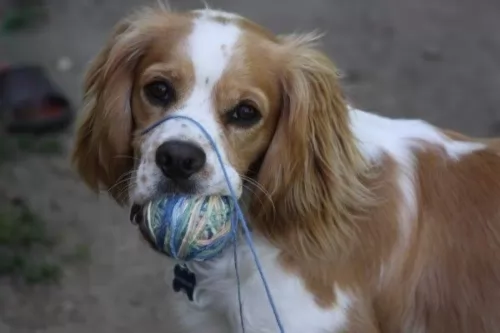 Known also as the Cockalier Spaniel, the Cockalier is a sweet crossbreed – a mix between the Cocker Spaniel and the Cavalier King Charles spaniel.
Known also as the Cockalier Spaniel, the Cockalier is a sweet crossbreed – a mix between the Cocker Spaniel and the Cavalier King Charles spaniel.
Both of these spaniels do have some differences. The Cockalier is a designer breed that hails from the USA. Because he is a hybrid breed the Cockalier isn’t recognized by the American Kennel Club, but as a hybrid, it is recognized by the American Canine Hybrid Club (ACHC).
 The Hamilton Hound is a good looking, well proportioned dog with an attractive, 2-layered, shortish, smooth, tri-colored coat of tan, black and white.
The Hamilton Hound is a good looking, well proportioned dog with an attractive, 2-layered, shortish, smooth, tri-colored coat of tan, black and white.
These dogs stand at about 49-61cm in height and they weigh 23 – 27kg. The eyes are brown and the ears are floppy. He is a deep chested dog with a long tail which he carries straight or which is somewhat curved. He has a longish head with a skull that is slightly arched and broad.
Friendly, social and amicable, the even-tempered Hamiltonstovare is a dog that loves to be with his human family. When you look at him you look at him as a friend as he has a calm, intelligent expression about him.
He is a stubborn, non-aggressive dog that is intelligent and this makes it easy to have him trained and socialized to make him obedient and to follow some easy instructions.
He is a very active dog and will love an owner who leads an active, outdoor life. Most Hamiltons love swimming too and he will be thrilled if you plunge in with him on a hot day.
He has always been a hunting dog, and while they love spending time with their human family, he loves the thrill of the hunt. He is a playful dog too, loving to entertain and be entertained, and he gets on well with children.
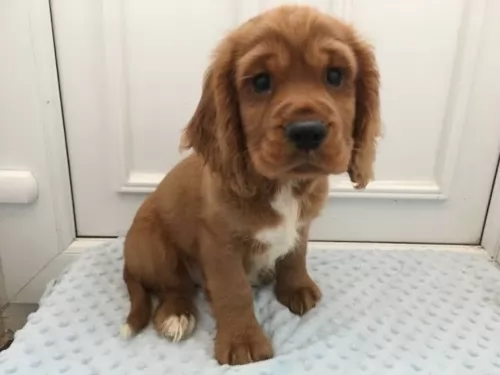 The Cockalier is a medium-sized dog standing at between 30 and 38cm in height and weighing roughly between 5 and 12kg.
The Cockalier is a medium-sized dog standing at between 30 and 38cm in height and weighing roughly between 5 and 12kg.
The coat of the Cockalier is silky and wavy. The coat is medium length and can be in colors such as golden, red, black or maybe white and brown.
The ears are fairly long and floppy, the eyes brown and expressive and the tail docked. If left, the tail is long and feathery.
The Cockalier is lively, gentle, intelligent and friendly with his human family, though he can be a little bit aloof with strangers.
He bonds very strongly with his family. They’re robust and are playful with children. They’re active dogs too and love nothing more than a hectic ball game. They don’t know when to stop and can become utterly exhausted if you don’t stop the game.
Have him trained and socialized and then he becomes even more amicable and he’s smart enough to learn basic commands without any trouble.
 Hamiltonstovares make wonderful companions simply because they’re friendly dogs with stable personalities.
Hamiltonstovares make wonderful companions simply because they’re friendly dogs with stable personalities.
He is actually an ‘all-rounder’ dog – well proportioned and good-looking and with a solid personality to match.
He is lithe and muscled and as a multi-purpose dog, he has been used to follow scents and hunt down prey. These skills as well as his loyal characteristics have made him a versatile, sought after pet.
Another bonus when you own a dog like this is that he is also a low maintenance dog, shedding very little. He is intelligent too and easy to train, and all these qualities make him a wonderful pet to own.
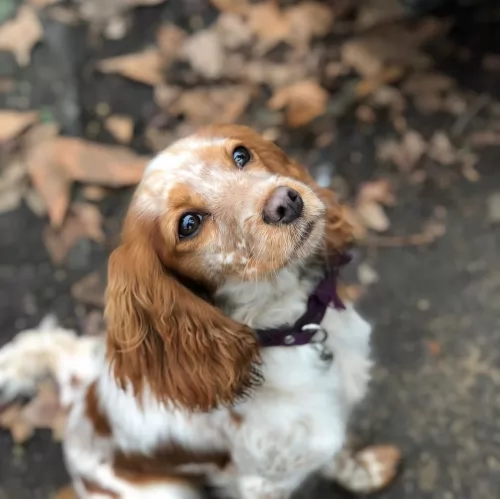 The Cockalier is such a clever dog and he wants to please. He just loves his human owners, protecting them against strangers. He doesn’t take too kindly to strangers, preferring to devote all his love and loyalty to those he knows.
The Cockalier is such a clever dog and he wants to please. He just loves his human owners, protecting them against strangers. He doesn’t take too kindly to strangers, preferring to devote all his love and loyalty to those he knows.
He just craves attention and wants to be in your vicinity all the time. He is also good with children and will get on well with other pets in the home.
Once you’ve had a Cockalier in your life, you’ll want to reconsider having one of them again as they make awesome pets and companions.
 Every dog has different genetic make ups that affect them and they have different susceptibilities to illnesses. The average life expectancy of a Hamiltonstovare is between 10 and 13 years when he is looked after and well nourished with top quality food.
Every dog has different genetic make ups that affect them and they have different susceptibilities to illnesses. The average life expectancy of a Hamiltonstovare is between 10 and 13 years when he is looked after and well nourished with top quality food.
Some things to look out for are hip dysplasia, cancer, bloat and obesity.
Look out for obesity in your pet because just like with people, obesity leads to other diseases and complications in dogs such as diabetes, respiratory disorders, osteoarthritis and hypertension.
If your dog needs to lose weight, and you just don’t know how you’re going to deny him the treats he loves, speak to your vet who can even work out a weight management program for him.
Cancer is a formidable threat to all dog breeds. The most obvious sign that your dog could have cancer is abnormal swelling that gets larger under the skin. The idea is get get the lump removed and biopsied as soon as possible. Loss of appetite, weight loss, sores that don’t heal and bleeding or discharge are all signs of cancer.
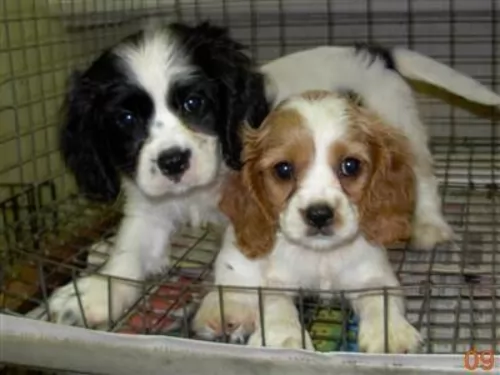 The Cockalier is a healthy dog breed and can reach between 12 and 15 years of age. Look out for common canine health issues such as hearing loss and ear infection and vision issues.
The Cockalier is a healthy dog breed and can reach between 12 and 15 years of age. Look out for common canine health issues such as hearing loss and ear infection and vision issues.
Cockaliers that have an ear infection will shake their head and scratch their ears. The inside of the ears may be red and there may be an unpleasant smell coming from the ears. Your pet will need to see the vet.
This is a common disease with King Charles Spaniels where the mitral valve wears out and leaks and is associated with a heart murmur.
The earliest sign of a leaking mitral valve is normally a heart murmur, but it doesn’t mean heart failure is imminent, but congestive heart failure will eventuallt occur. Your dog will tire when walking, be lethargic and also have a cough. It will definitely be time to see the vet.
 The Hamiltonstovare has a double coat but even so, he is a low maintenance breed that will simply require a brush twice a week to remove dead and loose hair.
The Hamiltonstovare has a double coat but even so, he is a low maintenance breed that will simply require a brush twice a week to remove dead and loose hair.
Because he has floppy ears, it is important to check his ears because too much wax and debris can lead to a painful infection.
This is a high energy dog who will need the right amount of exercise as well as mental stimulation to be at his best. A nice walk every day will be excellent for him as well as the usual ball games in the garden.
If you get your Hamilton puppy from a breeder, it would be wise to stick to the same food they were feeding your puppy with. Suddenly changing his good could cause digestive upsets.
Every Hamilton requires top quality food that meets all his nutritional requirements. If you give him commercially manufactured food, make sure to follow the instructions with regards to the amount of food you give him as he can put on too much weight.
These dogs are known to suffer with bloat, so rather give him smaller meals than one large meal a day. Your Hamilton should never be exercised immediately after eating a meal. Remember to always ensure a bowl of fresh, cool water is always available.
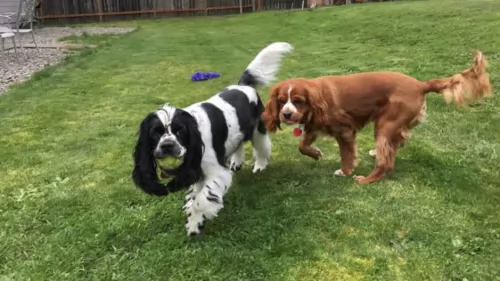 When you choose one of the commercially manufactured dog foods there are, you want to avoid those more inferior ones that have ingredients in them that can cause your dog to get sick.
When you choose one of the commercially manufactured dog foods there are, you want to avoid those more inferior ones that have ingredients in them that can cause your dog to get sick.
Look for the high-quality ones and choose the foods that have natural, wholesome ingredients in them. The vet can always help you with your decision to select a food that will of benefit to your pet.
Try to give your pet some good homemade food too such as some raw meat occasionally as well as boiled chicken, vegetables and brown rice. Fresh, cool water should be constantly available.
The Cockalier is going to require some brushing because he sheds quite a bit. Some dog owners prefer to get the Cockalier professionally trimmed. During grooming, check your pet over for any unusual lumps.
Your Cockalier will also need to have his nails trimmed, and because of the long ears, you will need to look inside the ears to ensure there is no redness and signs of infection.
Some dog owners don’t have the time or they don’t want to probe inside their pet’s ears and then a doggy-grooming-parlor can be a good idea as they do all this for you.
The Cockalier is an energetic dog, requiring a lot of exercise and games. These dogs love water games and will love you spraying him with water from the garden hose. Failing that, he’ll jump right into the swimming pool with you. Ball games are just up his street, and he will remind you every day that it’s time for his walk.